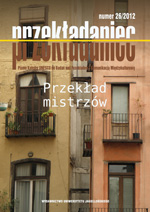Translatorskie konfrontacje: Stanisław Barańczak i Jacek Dehnel przekładają Philipa Larkina
Translatory Confrontations: Stanisław Barańczak and Jacek Dehnel Translate Philip Larkin
Author(s): Katarzyna SzymańskaSubject(s): Language and Literature Studies
Published by: Wydawnictwo Uniwersytetu Jagiellońskiego
Keywords: translation; reception; strategy; poetry; interpretation; rendition; translator; Larkin; Barańczak; Dehnel; Jarniewicz; Miłosz
Summary/Abstract: This article examines Polish reception of Philip Larkin, one of the most influential 20th-century English poets, and focuses on Stanisław Barańczak’s selection 44 wiersze (44 Poems; 1991) and Jacek Dehnel’s presentation of Zebrane (The Collected; 2008). My analysis compares the translators’ artistic stances (their role in the intercultural transfer and their translations’ modulating function in the target culture) as well as their intellectual inspirations and interpretative contexts. Barańczak as the fi rst “ambassador” of Philip Larkin is opposed by Dehnel, who concentrates on a meticulous, almost philological reconstruction of the source text. While Barańczak domesticates, Dehnel advertises his own texts as a remedy for such a model. Moreover, both translators have been influenced by the changing perception of Larkin’s poetry: Barańczak draws on the symbolical and thematic interpretations of his time as well as on critical essays by Seamus Heaney; Dehnel follows Jerzy Jarniewicz’s interpretations and, in general, the “new wave” of criticism after Larkin’s letters and biography by Motion were published. Thus, the Polish Larkin is shaped both by Barańczak’s metaphysical, brightened and metaphorical version and by Dehnel’s skeptical, ambivalent and concrete rendition.
Journal: Przekładaniec.
- Issue Year: 2012
- Issue No: 26
- Page Range: 202-218
- Page Count: 17
- Language: Polish

